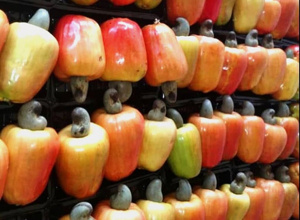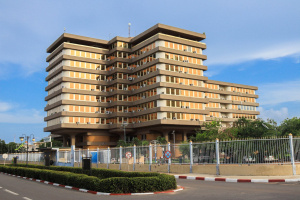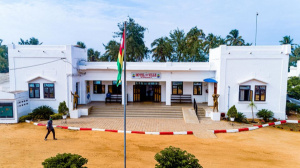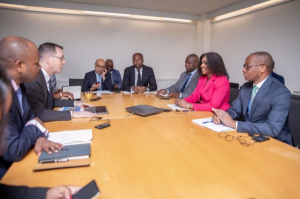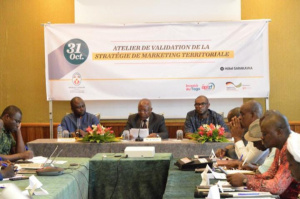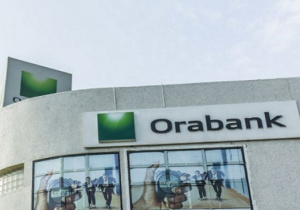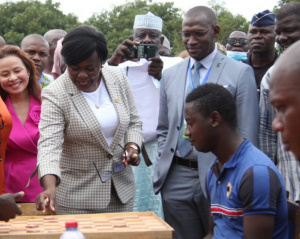Togo First
Togo Produced 16% Less Cashew in 2024, against 2023
Togo produced 34,500 tonnes of cashew nuts in 2024, compared to 41,000 tonnes in 2023, which is 16% down. N’Kalô, an independent consultant, disclosed the figure in preliminary estimates, reported by Ecofin Agency.
Despite the drop, Togo remains a significant player in the cashew sector, acting as an export relay for neighboring countries like Benin and Burkina Faso. Cashew trade between these nations totals around 165,000 tonnes, nearly five times Togo's national production.
Over the 2024 campaign, the cashew produced (cross-border and Togo’s) was shipped to India (160,000 tonnes), Vietnam (32,000 tonnes), and China (35,000 tonnes).
Meanwhile, only 11.6% of Togo’s output (4,000 tonnes) was processed domestically. According to N'kalô, the drop in Togolese production mirrors a regional trend in West Africa. N’kalô found that the region’s output slumped by about 15% over the period reviewed. The consultant attributes the drop to unfavorable climate conditions.
At the sub-regional level, total production reached approximately 2.6 million tonnes, down from a record 3.1 million tonnes the previous year. Côte d'Ivoire led the region with 1.1 million tonnes, followed by Nigeria with 355,000 tonnes and Guinea-Bissau at 263,000 tonnes.
Ayi Renaud Dossavi
Togo: Cyber Defense Africa Seeks Contractor to Build its Headquarters
Cyber Defense Africa (CDA) seeks a firm to build its headquarters in Togo. CDA launched the related tender last week.
The facility will span 1,000 square meters and is expected to be completed within nine months. It will include structural work, plumbing, electrical installations, and solar panels. The new headquarters will enhance CDA's visibility and efficiency and serve as the operational center for Togo's National Cybersecurity Incident Response Center (CERT).
This initiative is part of a broader national strategy to improve cybersecurity and safeguard citizens' data.
Founded in September 2019, the CDA is a simplified joint-stock company with a capital of CFA1.965 billion. It was created through a partnership between the Republic of Togo and Asseco Data Systems S.A. (ADS). The CDA protects the State’s information systems, inside and outside the country.
Togo: Minister of Finance and Economy Launches Contest to Hire New Personel
The Togolese Ministry of Finance is launching a contest to recruit new personnel today. Gilbert Bawara, the Minister of Civil Service, announced the contest last week. On the same occasion, the official revealed the cancellation of the national civil service recruitment competition that began on January 22, 2020.
Applications for the new recruitment can be submitted until November 29, 2024. Candidates can submit their applications at the Ministry of Finance in Lomé and at the regional directorates of Labor and Social Laws in Kara and Dapaong. Written exams for the contest are scheduled for December 21, 2024, according to a press release dated October 31, 2024.
Candidates who participated in the previous competition and wish to reapply are exempt from submitting a new application and paying the release fee. However, they must confirm their application in person.
Exceptions will be made to the age requirement as outlined in the opening decree. Details about participating in the competition will be published in the national daily Togo-Presse and on the Ministry of the Civil Service's website.
Ayi Renaud Dossavi
Togo: Lacs 1 Raised CFA 206.9 Million in First Nine Months of 2024
Togo’s Lacs 1 municipality, which includes Aného, 40 km east of Lomé, has raised CFA206.9 million between January and September 2024. This is 50.92% of the amount initially targeted–CFA406.4 million.
The performance was one of the major issues discussed during the 3rd ordinary consultation meeting of the Communal Revenue Monitoring Committee. According to the ATOP, the meeting was held on October 29 in Aného. Local stakeholders gathered to discuss strategies for mobilizing revenue and related challenges.
They also reviewed taxes, particularly those related to boats and fuel dispensing pumps, to maximize municipal revenue. Participants emphasized the importance of raising taxpayer awareness about their tax obligations.
During the meeting, local councilor Lawson Laté Kpekui commended attendees’ commitment to sustainable development initiatives carried out by municipal authorities. Last June, the municipality launched a census of its taxpayers; a move aimed at boosting tax collection across the municipality.
The Lacs 1 municipality has significant economic development potential, particularly in tourism and transit trade, as it serves as Togo's entry and exit point with Benin along the Abidjan-Lagos corridor.
Ayi Renaud Dossavi
IFC-TOGO Partnership: Sandra Johnson and Sergio Pimenta Review Common Projects
Sandra Johnson, the Minister and Secretary General of the Presidency of Togo, and Sergio Pimenta, Vice-President of the International Finance Corporation (IFC) for Africa, met to discuss the progress of projects funded by the IFC in Togo. The meeting occurred during the International Monetary Fund (IMF) and World Bank General Meetings held in Washington.
Among the projects discussed was internet connectivity in Togo. The IFC provided financing to Togocom through the Axian group. They also reviewed investments in the Zener group in the energy sector and support for Gozem in the mobility sector.
The discussions included a project to build 3,000 housing units in Togo by Shelter Afrique, as well as the upcoming launch of Star Garments Group Limited's operations, supported by IFC financing at the Plateforme industrielle d'Adétikopé (PIA). Star Garments Group Ltd. is a subsidiary of the American company Charles Komar & Sons.
Johnson and Pimenta also explored prospects for supporting the agri-food sector. The IFC plans to address the financing needs of agricultural micro and medium enterprises (VSEs) through leasing. To this end, the Fund will partner with local banks and investors. The project is valued at $100 million and should run from 2024 to 2030.
Esaïe Edoh
Togo Launches New Strategy to Attract Investment in Five Cities
A new territorial marketing strategy was launched last week in five Togolese cities: Kara, Blitta, Atakpamé, Kpalimé, and Aného. The strategy aims to attract investment in these cities, picked as part of the pilot stage of a larger project. The marketing strategy was validated on October 31 during a workshop organized by the Ministry of Investment Promotion.
Developed through a participatory approach, the strategy highlights the unique features and economic potential of each city while proposing tailored development projects. Supported by GIZ through the Private Sector Competitiveness Enhancement Program (ProComp), which is co-funded by Germany and the European Union, the goal is to position Togo as a preferred destination for investors.
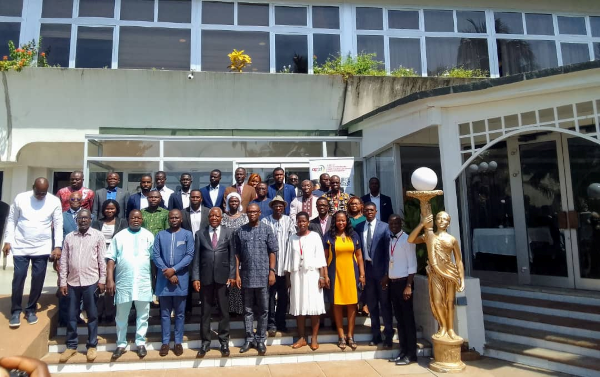
“The importance of territorial marketing in the management and promotion of cities lies not only in attracting investment but also in strengthening their image among residents and visitors. We aim to create a framework that inspires confidence in investors and makes them want to get involved in the Togolese dynamic,” explained Yawo Sikpa, Managing Director of the Investment Promotion Agency and Free Zone (API-ZF).
The selected cities were chosen for their strategic positioning and advantages for attracting short-term investments. The focus will be on encouraging domestic and foreign investment in key sectors such as agriculture, tourism, industry, information and communication technologies, and financial services.
Togo attracted only CFA27.5 billion in private investment in 2023, with 80% coming from foreign direct investment (FDI), down compared to previous years. Lomé has been ramping up efforts to turn these tides. In Q1 2024, regional institutional platforms were launched to engage local communities and leverage competitive advantages. Additionally, an investor reception scheme was rolled out last August.
Togo: Banks’ Public Debt Exposure Down 29% since 2019
In five years, Togo's banks have cut their exposure to public debt by about 29% (28.88%). This information comes from a report by the International Monetary Fund (IMF) during Togo's recent economic assessment under the Extended Credit Facility (ECF). As of January 2024, the total receivables from the State and public enterprises made up 22.9% of the total assets in Togo's banking sector, down from 32.2% in 2019.
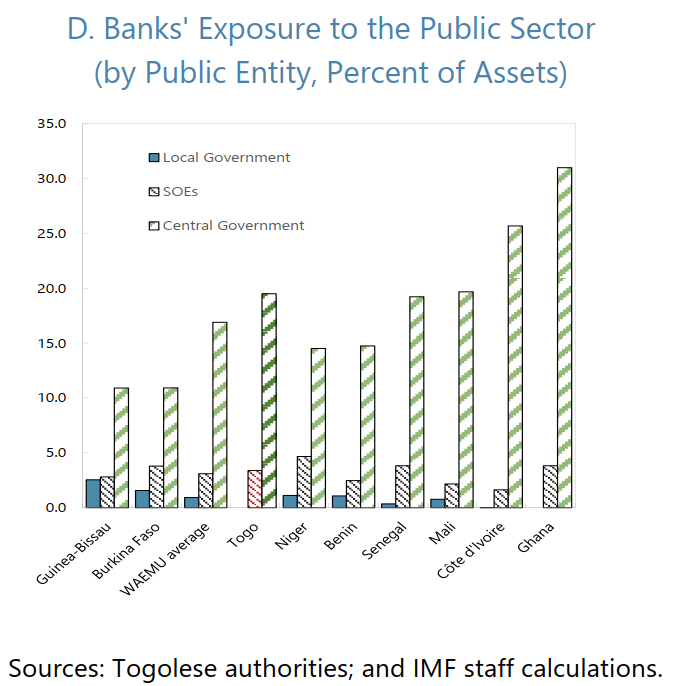
While this percentage remains higher than averages for the West African Economic and Monetary Union (WAEMU) and sub-Saharan Africa, it shows a trend of reducing obligations to the government, according to IMF experts.
“This decline is mainly due to a reduction in the share of government securities and loans to state-owned enterprises in total banking sector assets,” they noted. Additionally, there has been a decrease in the ratio of government claims in the private sector, which fell from 59.3% to 47.8% during the same period.
At the same time, Togolese banks have increased their financing from other WAEMU countries, stating: “Bank exposure would rise to 38% of total assets and the ratio of public and private sector receivables to 79.3% at the end of 2023 if exposure to other UEMOA countries is considered.” This shift suggests that Togolese banks are increasingly favoring sovereign bonds, considered less risky than private sector loans. However, this could potentially hinder credit growth in underfunded sectors like agriculture.
Ayi Renaud Dossavi
Togo: Tinga Fund Achieves 54% Connection Rate
As of mid-2024, two years after its launch, the Tinga Fund had successfully connected 21,430 households to Togo’s power grid. The achievement is detailed in the "Reform Implementation Report" recently released by the Ministry of Economy and Finance. According to the document, the program has reached 54% of its goal of connecting 40,000 households.
However, it is important to note that from January to June 2024, only 459 new households were connected in the Kara, Plateaux, Centrale, and Maritime regions. Connecting more people to the grid is essential to achieving the government's ambition of reaching a national electricity coverage rate of 70% by the end of 2024.
Moreover, the Tinga Fund has made notable progress in electrifying targeted areas. For instance, in the Savanes region, the electrification rate increased from 22% in 2022 to 33% in 2023. Similarly, in the Kara region, electricity coverage rose from 35% to 44%, while in the Plateaux region, it improved from 29% to 39%. This growth indicates an increase of around 10% for each of these regions.
Furthermore, it is essential to highlight that the Tinga Fund primarily aims to assist disadvantaged households by enabling them to connect to electricity networks. In exchange for this service, households pay a monthly fee of CFA1,000 for 4 to 10 years.
Esaïe Edoh
Togo to Host 2nd Edition West African Leisure Festival in November
Togo will be hosting the second edition of the West African Leisure Festival on November 15 and 16, 2024, at the Kégué stadium in Lomé. This year's theme is "Leisure: vectors of social cohesion and community development."
Launched on October 28 in collaboration with the Confederation of Ministers of Youth and Sports of the Francophonie (CONFEJES), the event aims to showcase the often overlooked role of leisure in French-speaking West African societies. The first edition took place in September 2022.
According to Etse Kodjo Klou, National Director of Leisure, "The Festival aims to bolster cooperation between West African countries that are members of CONFEJES." He added that “game sessions from countries that are part of CONFEJES are on the agenda. We will also have exchanges between communities. This chapter will welcome officials from each country."
Overall, 10 French-speaking West African countries will participate in the event: Benin, Burkina Faso, Cape Verde, Côte d'Ivoire, Guinea Conakry, Guinea-Bissau, Mali, Mauritania, Niger, and Senegal.
Ayi Renaud Dossavi
Togo: Chamber of Commerce Launches Digital Support for SMEs
The Chamber of Commerce and Industry (CCI-Togo) is set to support 150 small and medium-sized enterprises (SMEs) with their digital transformation. The goal is to enhance the competitiveness of Togolese businesses through digital technology. The CCI-Togo has launched a call for expressions of interest in partnership with the German Cooperation (GIZ).
The call, open to companies that provide non-digital services or products, targets 105 SMEs in Greater Lomé and 45 in other regions. Applicants must meet specific criteria, including being registered with a support or coaching structure, having at least 10 employees, and must have generated at least CFA30 million in revenues. Regular use of digital tools in business operations will be considered an advantage.
Selected SMEs will receive training and awareness programs focused on integrating digital tools into business management, online commerce, and social media use. This initiative builds on previous efforts by CCI-Togo, notably the Lon'Kelew project, which aimed to digitalize businesses and trained a dozen IT consultants last year to assist around 50 Togolese SMEs in their digital transition.
Applications must be submitted by November 07, 2024.
Ayi Renaud Dossavi

